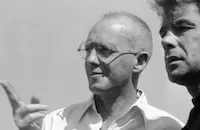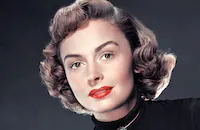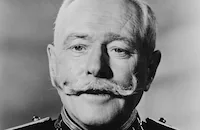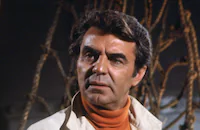Beyond Glory
Brief Synopsis
Cast & Crew
John Farrow
Alan Ladd
Donna Reed
George Macready
George Coulouris
Harold Vermilyea
Film Details
Technical Specs

Synopsis
At West Point Military Academy, cadet Rockwell "Rocky" Gilman is called to a board of inquiry to determine if he has been unduly harsh on lower classman Raymond Denmore, Jr. Raymond's father alleges that his son has complained that Rocky has bullied and hazed him. At the hearing, Raymond's lawyer, Lew Proctor, sets out to prove that Rocky is unfit and may even be criminally liable. Because of the serious nature of the charges, Rocky is adjured not to discuss the case with anyone, nor to leave his quarters. That night, Rocky breaks his date with his girl friend, Ann Daniels, without explanation. The hearing resumes the next day, and Rocky's friend, Cadet Sgt. Eddie Loughlin, takes the stand. Loughlin recounts how stoically Rocky withstood the rigors of academy training, especially in his first year, when his war injury was still troubling him. Rocky then takes the stand and speaks about his war experiences: Rocky is drafted in December 1941, and unwillingly becomes a soldier. When he learns that all soldiers must obey their superior officers without question, he applies for and successfully completes officer training. Rocky is placed in a regiment with his friend, West Point graduate Lt. Harry Daniels, and their friend, Loughlin. Harry is killed and Rocky is wounded during a battle against General Rommel's troops in Tunisia. Rocky spends two years in an Army hospital, and although he is awarded the Distinguished Service Cross, he turns down the medal and is honorably discharged. Rocky returns home to Brooklyn, and learns that his former girl friend has married. Rocky works five different jobs before realizing that he is unable to adjust to civilian life. On V-E night, the whole city celebrates, but Rocky is uneasy, feeling that people are dancing on the graves of countless soldiers, and instead goes to see Harry's family, including his wife Ann. Rocky concludes his statement by noting that he later enrolled at the Academy. John Craig, a nurse at the hospital where Rocky recovered from his war wounds, then testifies about his former patient: Rocky suffers from violent nightmares, but refuses to discuss what troubles him. When Dr. White gives him a drug to help him open up, Rocky finally reveals that during the battle in Tunis, Harry ordered him to make a counter-attack at a specific time, but Rocky inexplicably delayed the attack for three minutes, which resulted in Harry's death. Rocky is unable to explain the delay, and believes that he is a coward. At the hearing, Rocky refuses to speak about the battle, and agrees with Proctor's charge that he deliberately disobeyed orders. Proctor calls for an immediate court-martial, but the general hearing the case insists that Rocky have time to deliberate. That night, after receiving a note from Ann saying she is going away, Rocky sneaks out of camp and goes to see her in New York. Rocky tells her that he is resigning from West Point and can leave with her, but Ann refuses to accept that he is quitting after all his effort, and insists that he return to camp. The next day, Rocky continues to maintain that he caused Harry's death by his own disobedience. Pop Dewing, Rocky's adoptive father, unexpectedly arrives with three witnesses to speak on Rocky's behalf. The first to speak is Ann, who recalls the night she first met Rocky: On V-E day, Rocky first meets Ann and shocks her with his confession that he caused Harry's death. Ann realizes that he is tortured by misguided guilt, and although she is still in mourning, she tries to help him through his crisis. One day, she takes him to a West Point ceremony held to commemorate Harry's death. Rocky is uneasy at being in a military environment. Shortly after, Ann admits to her undersanding mother-in-law that she has feelings for Rocky. Mrs. Daniels then reads Harry's last letter, in which he tells her that he wants Ann to live normally if he should die. When Rocky comes over that night, he tells her that he has enrolled in West Point. Ann continues to see Rocky on holidays at West Point, but while he says that he cares for her, she is unsure if he intends to marry her. When Rocky breaks their latest date, Ann decides to leave him until he comes over with news of his resignation. Pop now calls White to the stand, who testifies that after looking over Rocky's medical records again, he realizes that there is a gap in his memory of the battle. A soldier from Rocky's regiment then speaks: After receiving Harry's orders in Tunis, Rocky marches ahead of the soldier as they approach a grove hiding German tanks. When the soldier goes back to help an injured comrade, Rocky is knocked unconscious by a nearby blast. The soldier returns for Rocky, who awakens and is unaware that he was ever unconscious. He is mortified to learn that the specific time appointed by Harry has passed, and destroys the tank, but Harry has already been killed. The soldier now says that because Rocky refused to speak about the incident, he remained ignorant of the concussion, which created the delay. Seeing that Rocky's record is untarnished, Raymond admits that he lied about Rocky's behavior during training, and the charges are dropped. Later, General Dwight D. Eisenhower speaks at the West Point graduation, and Rocky is among the proud graduates.

Director

John Farrow
Cast

Alan Ladd

Donna Reed

George Macready

George Coulouris

Harold Vermilyea

Henry Travers

Tom Neal
Conrad Janis

Dick Hogan
Paul Lees

Audie Murphy

Geraldine Wall
Louis Van Rooten
Charles Evans

Margaret Field
Sean Mcclory
Steve Pendleton
Vincent Donahue
Harlan Tucker

Russell Wade
Johnny Michaels
Robert Coleman

James Burke
Martin Lowell
David Ragan
Robert Winkler
Frank Mullen
Jack Searl
William Challee
Lester Dorr
John Benson
Bob Simpson
Marcia Yousen
Jerry James
John Sheehan
Francis Pierlot

Noel Neill
Anne Sterling
Tim Ryan
Dorothy Abbott
Rusty Marlowe
Joe Whitehead
Julia Faye
Virginia Vinson
Jerry James
Billy Burt
Don Shelton
Geraldine Jordan

Elaine Riley
William Neff
Bob Tidwell
Russell Arms
William Meader
Hal Rand
John Ardell
Art Howard
Gil Johnston
Edward Biby
Everett Glass
Lloyd Hagerty
Henry Guttman
Harold Miller
Joey Ray
Len Hendry
James Davies
Tommy Summers
Richard Gaunt
Jack Marvin
Jack Parker
James Fallet

Glen Vernon
Ward Ellis
Noel Reyburn
Hal Melone
Bob Templeton
Delia Bogart
Frank Marlowe
Robert Watson

Paul Picerni
Mickey Phillips
Stuart Holmes
Crew
Franz Bachelin
Harry Caplan
Robert Clatworthy
William H. Coleman
Sam Comer
Irving Cooper
Hans Dreier
Farciot Edouart
Robert Fellows
Hugo Grenzbach
William Wister Haines
Edith Head
Brig. Gen. Gerald J. Higgins
Jack Koffman
Jonathan Latimer
Richard Monroe
Ray Moyer
William Mull
Walter Oberst
Otto Pierce
Jim Rosenberger
John F. Seitz
Fred True
Charles Marquis Warren
Eda Warren
Wally Westmore
Victor Young

Film Details
Technical Specs

Articles
Sean McClory (1924-2003)
Born on March 8, 1924 in Dublin, Ireland, he became a leading man at the famous Abbey Theatre in the early '40s and relocated to the United States shortly after World War II. His first roles were small bits as a police officer in two RKO quickies: Dick Tracy's Dilemma and Dick Tracy Meets Gruesome (both 1947). He eventually graduated to more prestigious pictures like The Glass Menagerie (1950), Les Miserables (1952) and John Ford's The Quiet Man (1952).
After a few more supporting roles in quality pictures: Niagara (1953); the sci-fi chiller Them! (1954); and for John Ford again in The Long Gay Line (1955), McClory turned to television. He kept busy for several years with guest roles in a variety of popular shows: Bonanza, Wagon Train, Rawhide, Gunsmoke, The Outer Limits (1964) and countless others. By the mid-'60s, McClory became slightly more heavy-set, and began tossing off variations of jovial, "oirish" blarney for, yet again John Ford in Cheyenne Autumn (1964); and in a string of Disney pictures: Follow Me, Boys! (1966, his best role, a moving performance as the alcoholic father whose behavior alienates his son, played by a 15-year old Kurt Russell); The Happiest Millionaire (1967), and The Gnome-Mobile (1967), before he returned to television. His final role was in John Huston's acclaimed Irish opus The Dead (1987). He is survived by his wife, Peggy Webber McClory.
by Michael T. Toole

Sean McClory (1924-2003)
Quotes
Trivia
Notes
The working title of this film was The Long Grey Line. This film opens with the following written statement: "Dedicated to the Corps of Cadets at the United States Military Academy...and in particular to those cadets who, after proving themselves on the battlefronts of World War II, returned to accept the discipline of West Point in order to better themselves in their profession, and in the service of their country." Information in the Paramount Collection at the AMPAS Library indicates that Joan Caulfield was initially cast as "Ann Daniels," and that Roland Culver was cast as "General Brent." In addition, the CBCS incorrectly lists Edward Ryan as "Jensen." A pre-production Paramount News item noted that writer William Wister Haines was also to direct. The film was shot, in part, on location at United States Military Academy at West Point, NY, beginning on September 4, 1947. War Dept. records also indicate that Charles Rogers, the head of Bro-Rog Pictures, originally wanted to film June Week at West Point for his film The Spirit of West Point, but was denied permission because of conflicts with Paramount's previously scheduled production requirements for Beyond Glory. For further information on the West Point production conflict, see the entry below for The Spirit of West Point. In addition, portions of General Dwight D. Eisenhower's address to the 1947 graduating class at the United States Military Academy are included in the film. According to War Dept. records, because there was no existing newsreel footage of his actual speech, Paramount arranged to shoot a brief close-up of Eisenhower speaking lines from the address in late 1947 at the Dept. of Agriculture in Washington, D.C. Beyond Glory marked the feature film debut of Audie Murphy, the most decorated soldier of World War II. Murphy went on to appear in various films, most notably the 1955 film To Hell and Back, which recounted his own experiences in the war.














